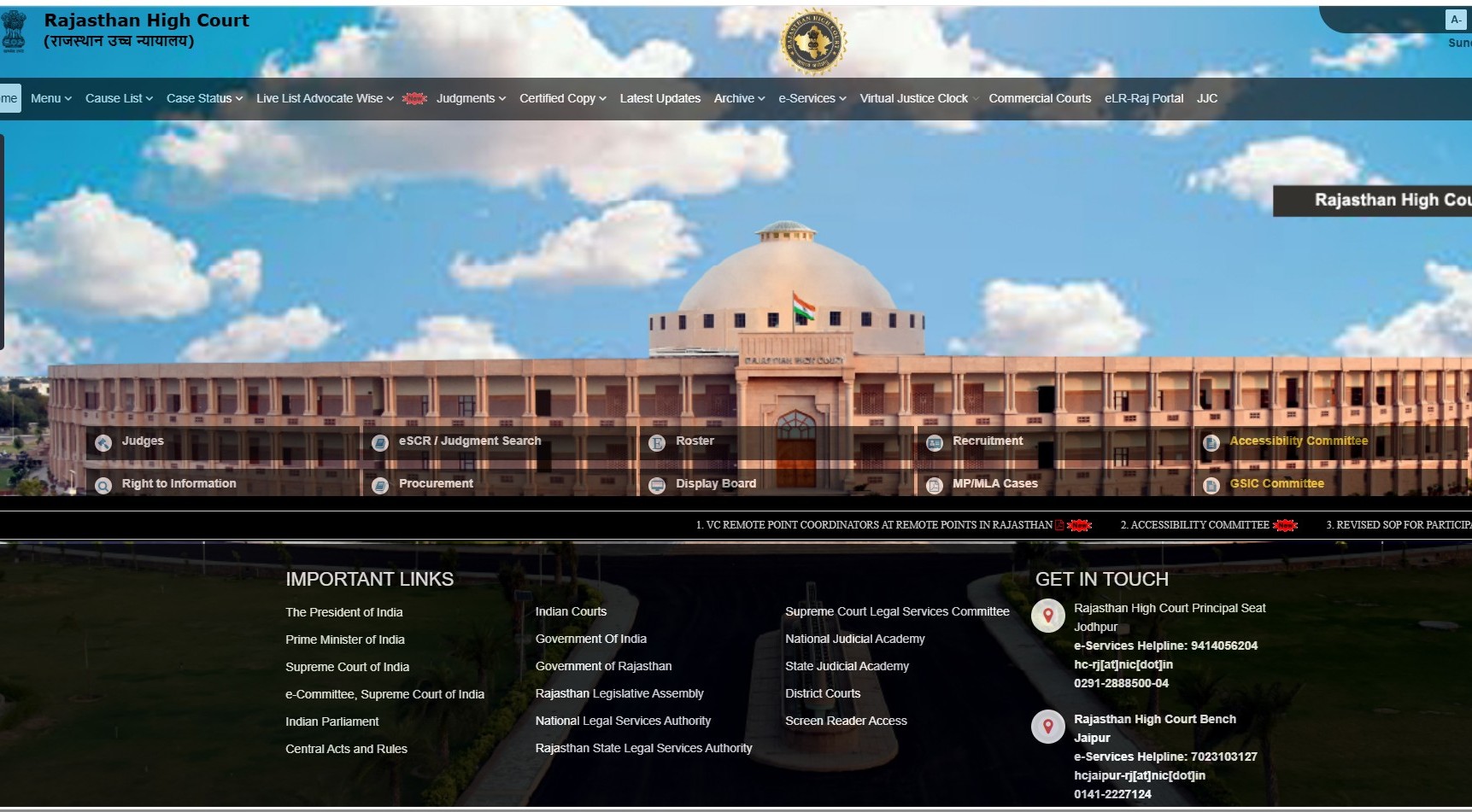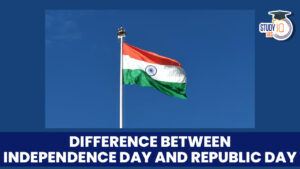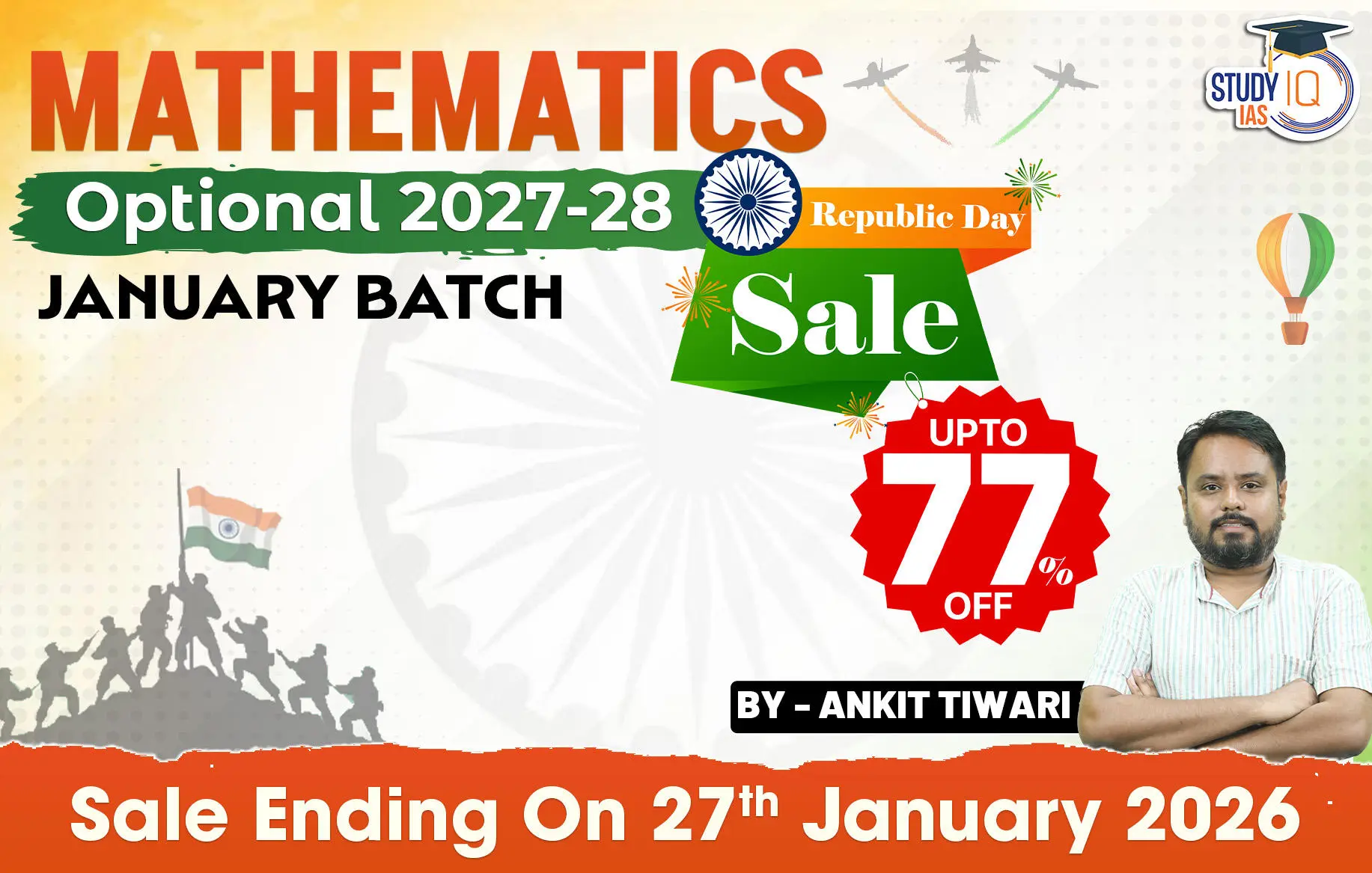The Rajasthan Judicial Services (RJS) Preliminary Exam 2025 was successfully conducted on 27th July 2025 across various centres in the state. Aspiring civil judges and magistrates from across Rajasthan appeared for this highly competitive exam, conducted by the Rajasthan High Court. This article provides the RJS 2025 Question Paper PDF with Answer Key and Detailed Explanations, a comprehensive exam overview, and the expected trends to help future aspirants strategize effectively.
Q1. A decree is passed by the Civil Judge, Ajmer. Later on, on account of creation of new district namely Beawar, local jurisdiction has been changed and now, the land in question comes under the jurisdiction of Civil Judge, Beawar. Which of the following courts have jurisdiction to execute such decree?
(1) Civil Judge Ajmer only
(2) Civil Judge Beawar only
(3) Both Civil Judge Ajmer and Beawar
(4) Neither Civil Judge Ajmer nor Civil Judge Beawar but the jurisdiction is to be decided by the High Court
Answer: 3
Explanation:
It is governed by Section 37 of the Code of Civil Procedure.
This means that even after territorial reorganization (like creation of a new district), both:
- The court that originally passed the decree (Civil Judge, Ajmer), and
- The new court having jurisdiction over the area (Civil Judge, Beawar) have the power to execute the decree.
Q2. Which of the following statements is not correct with regard to the payment and delivery under the Sale of Goods Act, 1930?
(1) Unless otherwise agreed, delivery of the goods and payment of the price are concurrent conditions.
(2) Delivery of goods sold may be made by doing anything which the parties agree shall be treated as delivery or which has the effect of putting the goods in the possession of the buyer or of any person authorised to hold them on his behalf.
(3) A delivery of part of goods, in progress of the delivery of the whole, has the same effect, for the purpose of passing the property in such goods, as a delivery of the whole; but a delivery of part of the goods, with an intention of severing it from the whole, does not operate as a delivery of the remainder.
(4) Apart from any express contract, the seller of goods is bound to deliver them without waiting for the buyer to apply for delivery.
Answer: 4
Explanation:
According to Section 35, apart from any express contract, the seller is not bound to deliver the goods until the buyer applies for delivery. Thus, the seller is generally required to deliver only after the buyer has requested delivery unless the contract explicitly states otherwise
Q3. According to the provisions of the Hindu Minority and Guardianship Act, 1956, who is the natural guardian of an adopted son who is a minor?
(1) The adoptive father and after him the adoptive mother.
(2) The adoptive mother and after him the adoptive father.
(3) Amongst the adoptive father or mother, on whose instance, the adoption was made.
(4) Natural guardianship will always remain with the natural guardians.
Answer: 1
Explanation:
According to Section 7 of the Hindu Minority and Guardianship Act, 1956, the natural guardianship of an adopted minor son passes, upon adoption, to the adoptive father and—after him—to the adoptive mother.
Q4. Rule of Heydon’s case is known as –
(1) Mischief Rule
(2) Golden Rule of Interpretation
(3) Rule of Ejusdem Generis
(4) Rule of Reasonable Construction
Answer: 1
Explanation:
The Rule of Heydon’s case is known as the Mischief Rule. The other options—Golden Rule, Rule of Ejusdem Generis, and Rule of Reasonable Construction—are separate principles of statutory interpretation and are not associated with Heydon’s case.
Q5. Under Mohammedan law, a marriage with a woman undergoing “iddat” is –
(1) A valid marriage
(2) A void marriage
(3) An irregular marriage
(4) A marriage which is ab initio void
Answer: 3
Explanation:
Under Mohammedan (Muslim) law: Marrying a Woman Undergoing Iddat: A marriage contracted with a woman who is still observing her “iddat” (waiting period after divorce or the death of a husband) is not valid in the strict sense. However, the characterization varies based on the sect:
- Sunni Law: Such a marriage is considered irregular (fasid), not void. That means the marriage does not confer all the legal rights and obligations of a valid marriage, but it is not treated as if it never existed. If consummated, the children are considered legitimate.
- Shia Law: Such a marriage is considered void (batil).
Q6. For the purposes of the Limitation Act, 1963, a suit is instituted, in the case of a claim against a company which is being wound up by the court, when –
(1) the claimant first sends in his claim to the official liquidator.
(2) the claim is accepted by the official liquidator.
(3) the official liquidator took cognizance of the claim sent to him by the claimant.
(4) the official liquidator issues notice to the opposite party.
Answer : 1
Explanation:
As per Section 3(2)(a)(iii) of the Limitation Act, 1963, in the case of a claim against a company which is being wound up by the court, a suit is considered to be instituted when the claimant first sends in his claim to the official liquidator.
Q7. Under the provisions of section 133 of the Code of Civil Procedure, 1908, which amongst the following is not entitled for exemption from personal appearance?
(1) The Vice-President of India
(2) The Prime Minister of India
(3) The Ministers of States
(4) The Deputy Speaker of the House of the People
Answer: 4
Explanation:
Section 133(1) of the CPC specifically lists the following persons as entitled to exemption from personal appearance in court:
- The President of India,
- The Vice-President of India,
- The Speaker of the House of the People (Lok Sabha),
- The Ministers of the Union,
- The Judges of the Supreme Court,
- The Governors of States and administrators of Union Territories,
- The Speakers of State Legislative Assemblies,
- The Chairman of State Legislative Councils,
- The Ministers of States,
- The Judges of the High Courts,
- Persons to whom Section 87B applies.
The list does not include the Deputy Speaker of the House of the People. Only the Speaker is specifically exempted. Therefore, the Deputy Speaker is not entitled to such exemption under Section 133 CPC.
Q8.Which of the following statements is not correct with regard to “Primary Evidence”?
(1) Where a document is executed in counterpart, each counterpart being executed by one or some of the parties only, each counterpart is primary evidence as against the parties executing it.
(2) Where a number of documents are all made by one uniform process, as in the case of printing, lithography or photography, each is primary evidence of the contents of the rest; and even if they are all copies of a common original, they are the primary evidence of the contents of the original.
(3) Where an electronic or digital record is created or stored, and such storage occurs simultaneously or sequentially in multiple files, each such file is primary evidence.
(4) All the above are correct.
Answer: 2
Explanation:
Section 62 of Indian Evidence Act- Primary evidence means the documents itself produced for inspection of the Court.
Explanation 1. – Where a document is executed in several parts each part is primary evidence of the document :
Where a document is executed in counterpart, each counterpart being executed by one or some of the parties only, each counterpart is primary evidence as against the parties executing it.
Explanation 2. – Where a number of documents are all made by one uniform process, as in the case of printing, lithography or photography, each is primary evidence of the contents of the rest; but, where they are all copies of a common original, they are not primary evidence of the contents of the original.
Q9. According to The Hindu Marriage Act, 1955, “Saptapadi” means –
(1) the taking of seven steps by the bridegroom and the bride wherein for three steps bridegroom will walk behind the bride and for four steps bride will walk behind the bridegroom.
(2) the taking of seven steps by the bridegroom and the bride wherein for three steps bride will walk behind the bridegroom and for four steps bridegroom will walk behind the bride.
(3) the taking of seven steps by the bridegroom and the bride jointly before the sacred fire.
(4) the taking of seven rounds by the bridegroom and the bride jointly around the sacred fire.
Answer: 3
Explanation:
Section 7 of Hindu Marriage Act- Ceremonies for a Hindu marriage.-
(1) A Hindu marriage may be solemnized in accordance with the customary rites and ceremonies of either party thereto. (2) Where such rites and ceremonies include the saptapadi (that is, the taking of seven steps by the bridegroom and the bride jointly before the sacred fire), the marriage becomes complete and binding when the seventh step is taken.
Q10. In determining the amount of any compensation awarded under section 21 of the Specific Relief Act, 1963, the court shall be guided by the principles specified in…….
(1) Section 39 of the Indian Contract Act, 1872
(2) Section 53 of the Indian Contract Act, 1872
(3) Section 54 of the Indian Contract Act, 1872
(4) Section 73 of the Indian Contract Ac, 18972
Answer: 4
Explanation:
Section 21(4) of the Specific Relief Act, 1963, specifically provides that in determining the amount of any compensation awarded under this section, the court shall be guided by the principles specified in Section 73 of the Indian Contract Act, 1872. Section 73 of ICA lays down the rules regarding compensation for loss or damage caused by breach of contract; it ensures compensation is given for direct losses which naturally arise in the usual course of things or which the parties knew would likely result from the breach—not for remote or indirect loss.
Q11. Under the provisions of the Registration Act, 1908, a will may be presented or deposited for registration —
(1) within three months of its execution
(2) within three years of its execution
(3) within twelve years of its execution
(4) at any time
Answer: 4
Explanation:
Section 23 of the Registration Act, 1908, states that except for wills, documents must be presented for registration within four months from the date of execution, subject to certain relaxations.
However, wills are exempt from this time limit and may be registered at any time after their execution. This means there is no statutory time restriction on presenting a will for registration, unlike other documents which have a four-month limit (with possible extension up to eight months with a fine).
Q12. Under Mohammedan Law, an acknowledgment of a debt made during death-illness in favour of an heir _____
(1) is a valid proof and the same may be satisfied from the property of the deceased.
(2) is no proof at all of the debt and no effect can be given.
(3) is a valid proof but the same may be satisfied only if, after payment of funeral expenses and debts, sufficient property remains to satisfy the same.
(4) is a valid proof only if the deceased made a written acknowledgement in the presence of 2 witnesses, otherwise, the same is of no value.
Answer: 2
Explanation:
Under traditional Sunni Mohammedan Law, an acknowledgment of debt made by a Muslim during his death-illness (Marz-ul-Maut) in favor of an heir is not effective—it is regarded as being of no value and is not a valid basis for claiming the debt from the deceased’s property.
- In Sunni Law: Such acknowledgment is completely non-effective and does not entitle the heir to claim satisfaction from the property of the deceased.
- In Shia Law: The rules are more relaxed—a deathbed acknowledgement of a debt in favor of an heir can be recognized up to one-third of the property without the consent of other heirs.
Q13. Under the provisions of the Transfer of Property Act, 1882, unless there is something repugnant in the subject or context, “immoveable property” —
(1) includes standing timber.
(2) includes standing timber and growing crops.
(3) includes standing timber, growing crops and grass.
(4) does not include standing timber, growing crops and grass.
Answer: 4
Explanation:
Section 3 in The Transfer Of Property Act, 1882
Interpretation clause.— In this Act, unless there is something repugnant in the subject or context,— “immoveable property” does not include standing timber, growing crops or grass;
Q14. Which of the following writs means, “Quashing an order passed by a lower court that was without jurisdiction or against the principles of natural justice?
(1) Habeas Corpus
(2) Mandamus
(3) Quo Warranto
(4) Certiorari
Answer: 4
Explanation:
The writ of Certiorari is issued by a higher court (such as the High Court or Supreme Court) to quash an order passed by a lower court, tribunal, or quasi-judicial authority if that authority acted without jurisdiction, in excess of its powers, or in violation of the principles of natural justice. The primary purpose of certiorari is to keep a check on lower judicial bodies and ensure their actions remain lawful and just.
Q15. Under what circumstances a document which is chargeable with fee under Rajasthan Court Fee and Suit Valuation Act, 1961, can be filed or exhibited in any court including the High Court, without payment of a fee of an amount not less than that indicated as chargeable
under the said act?
(1) Whenever the filing or exhibition in a Criminal Court of a document, is in the opinion of the Court necessary to prevent a failure of justice.
(2) Whenever the filing or exhibition in a Civil Court of a document, is in the opinion of the Court necessary to prevent a failure of justice.
(3) Whenever the filing or exhibition in a Revenue Court of a document, is in the opinion of the Court necessary to prevent a failure of justice.
(4) All the above are correct.
Answer: 1
Explanation:
Section 4 of Rajasthan Court Fee and Suit Valuation Act, 1961 . Levy of fee in Courts and Public offices.- No document which is chargeable with fee under this Act shall-
(i) be filed, exhibited or recorded in, or be acted on or furnished by, any Court including the High Court, or
(ii) be filed, exhibited or recorded in any public office, or be acted on or furnished by any public officer, unless in respect of such document there be paid a fee of an amount not less than that indicated as chargeable under this Act:
Provided that, whenever the filing or exhibition in a Criminal Court of a document in respect of which the proper fee has not been paid, is in the opinion of the Court necessary to prevent a failure of justice, nothing contained in this section shall be deemed to prohibit such filling or exhibition.
Q16. In which of the following cases, notice to produce secondary evidence is required?
(1) When the document to be proved is itself a notice.
(2) When, from the nature of the case, the adverse party must know that he will be required to produce it.
(3) When it appears or is proved that the adverse party has obtained possession of the original by fraud or force.
(4) When the adverse party or his agent has denied the loss of the document.
Answer: 4
Explanation:
According to Section 66 of the Indian Evidence Act, 1872, notice to produce the original document is generally required before secondary evidence can be admitted. However, the Act specifically lays down exceptions where notice is not required:
- When the document to be proved is itself a notice.
- When, from the nature of the case, the adverse party must know that he will be required to produce it.
- When it is shown or proved that the adverse party has obtained possession of the original by fraud or force.
- When the adverse party or his agent has the original in court.
- When the adverse party or his agent has admitted the loss of the document.
- When the person in possession of the document is out of reach of, or not subject to, the process of the court.
Thus, where the adverse party or his agent has denied the loss of the document (as in option 4), a notice to produce is required before secondary evidence is admissible. The other scenarios listed in options 1, 2, and 3 are expressly exempted from the notice requirement by the law.
Q17. Any person interested in a contract may sue to have it rescinded, and such rescission may be adjudged by the court, on which of the following grounds?
(1) where the contract is not voidable or terminable by the plaintiff.
(2) where the contract is lawful for causes apparent on its face and the plaintiff is more to blame than the defendant.
(3) where the contract is voidable or terminable by the plaintiff.
(4) None of the above.
Answer: 3
Explanation:
Under Section 27 of the Specific Relief Act, 1963, any person interested in a contract may sue to have it rescinded, and such rescission may be adjudged by the court in any of the following cases, namely:—
(a) where the contract is voidable or terminable by the plaintiff;
(b) where the contract is unlawful for causes not apparent on its face and the defendant is more to blame than the plaintiff.
Q18. Which of the following is the best suited answer to fill in the blank of the statement below?
Where the registered address of a party is discovered by the Court to be incomplete, false or fictitious, the Court may, either on its own motion, or on the application of any party, order______
(1) in the case where such registered address was furnished by a defendant, his defence be struck out and he be placed in the same position as if he had not put up any defence.
(2) in the case where such registered address was furnished by a plaintiff, stay of the suit.
(3) Both (1) & (2) are correct.
(4) Both (1) & (2) are incorrect.
Answer: 3
Explanation:
Order VI Rule 14A(5) of the Code of Civil Procedure, 1908 states that if the court discovers a party’s registered address to be incomplete, false, or fictitious, it may order as follows:
- If furnished by a plaintiff: The court may stay the suit.
- If furnished by a defendant: The court may strike out his defence and place him in the same position as if he had not put up any defence.
Q19. Who amongst the following is not heir in Class 1 of the Schedule of the Hindu Succession Act, 1956?
(1) Son of a pre-deceased son of a pre-deceased son
(2) Daughter of a pre-deceased daughter of a pre-deceased son
(3) Father
(4) Mother
Answer: 3
Explanation:
Class 1 heirs under the Hindu Succession Act, 1956 (Section 8 and Schedule) generally include:
- Son, daughter, widow, mother,
- Son of a pre-deceased son (grandson),
- Daughter of a pre-deceased son,
- Son of a pre-deceased daughter,
- Daughter of a pre-deceased daughter,
- Widow of a pre-deceased son,
- Son of a pre-deceased son of a pre-deceased son,
- Daughter of a pre-deceased son of a pre-deceased son, etc.
The father of the deceased is not a Class 1 heir; instead, he is a Class 2 heir as per the Act.
Q20. Which of the following statements is correct with regard to the provision regarding submission of resignation by a Judge of the Supreme Court of India?
(1) A Judge of the Supreme Court may, by writing under his hand addressed to the President, resign his office.
(2) A Judge of the Supreme Court may, by writing under his hand addressed to the Chief Justice of India, resign his office.
(3) A Judge of the Supreme Court may, by announcing the same in the open court during court hours, resign his office.
(4) A Judge of the Supreme Court may, by writing under his hand addressed to the Central Council of Ministers, resign his office.
Answer: 1
Explanation:
As per Article 124(2)(a) of the Constitution of India, a Judge of the Supreme Court may resign by submitting a written resignation under his hand addressed to the President of India.
Q21. According to the provisions of the Rajasthan Rent Control Act, 2001, an appeal filed in the Appellate Rent Tribunal shall be decided within ——
(1) a period of one hundred and eighty days from the date of service of notice of appeal on the respondent.
(2) a period of one hundred and eighty days from the date of the order passed by the Rent Tribunal.
(3) a period of one year from the date of service of notice of appeal on the respondent.
(4) a period of one year from the date of the order passed by Rent Tribunal.
Answer: 1
Explanation:
Section 19(8) of Rajasthan Rent Control Act, 2001, – The Appellate Rent Tribunal shall, thereafter, fix a date of hearing which shall not be later than forty five days -from the date of service of notice of appeal on the respondent and the appeal shall be disposed of’ within a period of one hundred and eighty days from the date of service of notice of appeal on the respondent.
Q22. Under the provisions of the Transfer of Property Act, 1882, “Sale” means –
(1) a transfer of ownership, in exchange for a price paid but it does not include the price which has been promised.
(2) a transfer of ownership in exchange for a price paid or promised but it does not include the price partly-paid and partly-promised.
(3) a transfer of ownership in exchange for a price paid or promised or part-paid and part-promised.
(4) just a receipt of a price of property, which has no relation with the transfer of ownership.
Answer: 3
Explanation:
Section 54 of the Transfer of Property Act, 1882 defines “sale” as:
“Sale” is a transfer of ownership in exchange for a price paid or promised or part-paid and part-promised.
Q23. Saleem’ sells ‘Babloo’ a horse and verbally warrants him sound. ‘Saleem’ gives ‘Babloo’ a paper in these words: “Bought of ‘Saleem’ a horse of Rs. 500.” Examine the correct answer.
(1) ‘Babloo’ cannot prove the verbal warranty.
(2) ‘Babloo’ may prove the verbal warranty.
(3) Verbal warranty is of no value since the fact of sale is written on a paper, hence, the same cannot be proved.
(4) None of the above options is correct.
Answer: 2
Explanation:
Legal Principle Involved:
This scenario is governed by Section 92, Proviso (2) of the Indian Evidence Act, 1872.
- Section 92 generally bars any oral evidence to contradict, vary, add to, or subtract from the terms of a written contract between the parties.
- Proviso (2) to Section 92 makes an exception: If there is a separate oral agreement on a distinct collateral matter—something not inconsistent with the written contract—such oral agreement may be proved.
Section 92 Illustration (g)- A sells B a horse and verbally warrants him sound. A gives B a paper in these words Bought of A a horse for Rs. 500. B may prove the verbal warranty.
Q24. Words and expressions used in the Bharatiya Sakshya Adhiniyam, 2023 and not defined therein, but defined in shall have the same meanings as assigned to them in the said Act and Sanhitas.
(1) the Code of Civil Procedure, 1908, the Bharatiya Nagarik Suraksha Sanhita, 2023 and the Bharatiya Nyaya Sanhita, 2023
(2) the Code of Civil Procedure, 1908, the Specific Relief Act, 1963, the Information Technology Act, 2000, the Bharatiya Nagarik Suraksha Sanita, 2023 and the Bharatiya Nyaya Sanhita, 2023
(3) the Code of Civil Procedure, 1908, the Bharatiya Nagarik Suraksha Sanhita, 2023, the Bharatiya Nyaya Sanita, 2023 and the Information Technology Act, 2000
(4) the Information Technology Act, 2000, the Bharatiya Nagarik Suraksha Sanita, 2023 and the Bharatiya Nyaya Sanhita, 2023
Answer:4
Explanation:
Section 2(2) of the Bharatiya Sakshya Adhiniyam, 2023 expressly provides:
“Words and expressions used herein and not defined but defined in the Information Technology Act, 2000, the Bharatiya Nagarik Suraksha Sanhita, 2023 and the Bharatiya Nyaya Sanhita, 2023 shall have the same meanings as assigned to them in the said Act and Sanhitas.”
Q25. Under the provisions of Rajasthan Land Revenue Act, 1956, “Nazul Land” shall mean —
(1) abadi land within the limits of a municipality only, vesting in the State Government.
(2) abadi land within the limits of a panchayat circle only, vesting in the State Government.
(3) abadi land within the limits of a municipality or a panchayat circle or a village, town or city, vesting in the State Government.
(4) any land belongs to the State Government or as the case may be, to the Central Government.
Answer: 3
Explanation:
According to Section 3(1) (i-b) of the Rajasthan Land Revenue Act, 1956, “Nazul Land” is defined as:“abadi land within the limits of a municipality or a panchayat circle or a village, town or city, vesting in the State Government”
Q26. Which of the following statements is correct with regard to the general rule of inheritance under Mohammedan Law?
(1) There is no distinction under the Mohammedan Law of inheritance between movable and immovable property or between ancestral and self-acquired property.
(2) There is no distinction under the Mohammedan Law of inheritance between movable and immovable property but there is a clear distinction between ancestral and self-acquired property.
(3) There is no distinction under the Mohammedan Law of inheritance between ancestral and self-acquired property but there is a clear distinction between movable and immovable property.
(4) There is a clear distinction under the Mohammedan Law of inheritance between movable and immovable property or between ancestral and self-acquired property.
Answer: 1
Explanation:
Muslim law treats both movable and immovable property equally for the purposes of inheritance. There is no separate set of rules depending on the type of property; the same principles govern all the property left by a deceased Muslim. Mohammedan law also does not recognize a distinction between ancestral property (property inherited from ancestors) and self-acquired property (property acquired by one’s own efforts).
Q27. With regard to the provisions of second appeal under the Code of Civil Procedure, 1908, which of the following statements is not correct?
(1) Second appeal shall lie to the High Court from every decree passed in appeal by any Court subordinate to the High Court, if the High Court is satisfied that the case involves a substantial question of law.
(2) Second appeal under section 100 of the Code of Civil Procedure, 1908 cannot be filed against an appellate decree passed ex parte.
(3) In an appeal under section 100 of the Code of Civil Procedure, 1908, the memorandum of appeal shall precisely state the substantial question of law involved in the appeal.
(4) Where the High Court is satisfied that a substantial question of law is involved in any case, it shall formulate that question.
Answer: 2
Explanation:
Section 100(2) of CPC, specifically allows an appeal under this section to be filed even when the appellate decree was passed ex parte. Therefore, a second appeal can be filed against an ex parte appellate decree.
Q28. Under the provisions of the Limitation Act, 1963, which of the following statements is correct with regard to “Acknowledgment”?
(1) An application for the execution of a decree or order shall be deemed to be an application in respect of any property or right.
(2) An acknowledgment may be sufficient though it omits to specify the exact nature of the property or right.
(3) For the purposes of an acknowledgment, the word “signed” means signed personally and does not include signed by any agent duly authorized in this behalf.
(4) None of the above is correct.
Answer: 2
Explanation:
Section 18 of the Limitation Act, 1963, and its Explanation make it clear that: An acknowledgment can be valid even if it does not specify the exact nature of the property or right involved, as long as it admits the liability in some form. The acknowledgment may be sufficient even if it omits these specifics.
Section 18, Explanation (a)—For the purposes of this section,— an acknowledgment may be sufficient though it omits to specify the exact nature of the property or right, or avers that the time for payment, delivery, performance or enjoyment has not yet come or is accompanied by a refusal to pay, deliver, perform or permit to enjoy, or is coupled with a claim to set off, or is addressed to a person other than a person entitled to the property or right,
Q29. Under the provisions of the Transfer of Property Act, 1882, which of the following lease can be made by oral agreement?
- A lease of immoveable property for any term exceeding one year.
- A lease of immoveable property from year to year.
- A lease of immoveable property for any term not exceeding one year, accompanied by delivery of possession.
- None of the above, because the lease of immoveable property cannot be made by oral agreement.
Answer: 3
Explanation:
Under the provisions of the Transfer of Property Act, 1882— Section 107—a lease of immoveable property for any term exceeding one year, or from year to year, or reserving a yearly rent, can be made only by a registered instrument and not by oral agreement. However, a lease of immoveable property for any term not exceeding one year, accompanied by delivery of possession, can be made by oral agreement.
Q30. Leading questions –
(1) must not, if objected to by the adverse party, be asked in an examination-in-chief, or in a re-examination, except with the permission of the Court.
(2) must not be asked in an examination-in-chief, or in a re-examination, except with the permission of the Court.
(3) must not, if objected to by the adverse party, be asked in an examination-in-chief, except with the permission of the Court but the same may be asked in the cross- examination or re-examination.
(4) must not, if objected to by the adverse party, be asked in an examination-in-chief, or in cross-examination or in a re-examination, except with the permission of the court.
Answer: 1
Explanation:
Section 142 of Indian Evidence Act- When they must not be asked. –– Leading questions must not, if objected to by the adverse party, be asked in an examination-in-chief, or in a re-examination, except with the permission of the Court.
The Court shall permit leading questions as to matters which are introductory or undisputed, or which have, in its opinion, been already sufficiently proved.
Q31. Ramesh is an agent for the sale of goods, having authority to sell on credit. Ramesh sells to Hakam Singh on credit, without making proper and usual enquiries with regard to his solvency. Later on, it reveals that Hakam Singh was(solvent at the time of such sale. Ramesh –
(1) must make compensation to his principal in respect of any loss thereby sustained
(2) cannot be held liable for compensation to his principal in respect of any loss thereby sustained because he did it in routine.
(3) was acting for his principal, therefore, the acts done by him will be treated as if the same were done by his principal and he cannot be held liable in respect of any loss thereby sustained.
(4) and his principal will have to share the losses equally.
Answer: 1
Explanation:
Q32. As per the provisions of the Sale of Goods Act, 1930, a contract of sale may be made in writing-
(1) But cannot be by word of mouth.
(2) Or by word of mouth but cannot be partly in writing and partly by word of mouth.
(3) Or by word of mouth, or partly in writing and partly by word of mouth but cannot be implied from the conduct of the parties.
(4) Or by word of mouth, or partly in writing and partly by word of mouth or may also be implied from the conduct of the parties.
Answer: 4
Explanation:
Section 5 of Sale of Goods Act, 1930, :
Contract of sale how made.—(1) A contract of sale is made by an offer to buy or sell goods for a price and the acceptance of such offer. The contract may provide for the immediate delivery of the goods
or immediate payment of the price or both, or for the delivery or payment by instalments, or that the delivery or payment or both shall be postponed.
(2) Subject to the provisions of any law for the time being in force, a contract of sale may be made in writing or by word of mouth, or partly in writing and partly by word of mouth or may be implied from the
conduct of the parties.
Q33. The certificate for recovery of possession issued under section 8 of the Rajasthan Rent Control Act, 2001 shall lapse if petition for execution
thereof has not been filed before the Tribunal within from the date such certificate becomes executable.
(1) Three months
(2) Six months
(3) One month
(4) One year
Answer: 2
Explanation:
Section 8, of the Rajasthan Rent Control Act, 2001-
Provided that the certificate for recovery of possession issued in this section shall lapse if petition for execution thereof has not been filed before the Tribunal within six months from the date such certificate becomes executable.
Q34. According to the provisions of the Hindu Adoption and Maintenance Act, 1956, where the parentage of the child is not known, by whom and to whom, a child can be given in adoption?
(1) The guardian of the child may give the child in adoption with the previous permission of the court to any person but not to the guardian himself.
(2) The guardian of the child may give the child in adoption with the previous permission of the court to himself only.
(3) The person who is taken care of the child i.e. giving shelter, food, clothes & other essentials etc., irrespective of the fact whether such person is a guardian in the eyes of law or not, with the previous permission of the court, may give the child in adoption to any person including himself.
(4) The guardian of the child may give the child in adoption with the previous permission of the court to any person including the guardian himself.
Answer: 4
Explanation:
Under Section 9(4) of the Hindu Adoption and Maintenance Act, 1956, when the parentage of a child is not known (i.e., the child is abandoned or orphaned), the guardian of the child may, with the previous permission of the court, give the child in adoption.
Q35. Which of the following is best suited to fill in the blank?
Consent is said to be free when it is not caused by_______
(1) Coercion or Undue Influence
(2) Fraud or Misrepresentation
(3) Misappropriation or Cheating
(4) All the above are correct
Answer: 3
Explanation:
Section 14 of the Indian Contract Act, 1872, explicitly states:
Consent is said to be free when it is not caused by—
(1) coercion,
(2) undue influence,
(3) fraud,
(4) misrepresentation, or
(5) mistake (subject to the provisions of Sections 20, 21, and 22)
Q36. Every investigation in relation to an offence under sections 376, 376A, 376AB, 376B, 376C, 376D, 376DA, 376DB or 376E of the Indian Penal Code, 1860, shall be completed within____from the date on which the information was recorded by the officer in charge of the police station.
(1) one month
(2) three months
(3) two months
(4) 45 days
Answer: 3
Explanation:
According to Section 173(1A) of the Code of Criminal Procedure (CrPC),
“The investigation in relation to an offence under sections 376, 376A, 376AB, 376B, 376C, 376D, 376DA, 376DB or 376E of the Indian Penal Code shall be completed within two months from the date on which the information was recorded by the officer in charge of the police station.”
[Inserted by the Code of Criminal Procedure (Amendment) Act, 2008 (5 of 2009), Section 16 (a).]
Q37. Under the provisions of the Juvenile Justice (Care and Protection of Children) Act, 2015, “juvenile” means –
(1) a child below the age of sixteen years
(2) a male child below the age of eighteen years or a female child below the age of sixteen years
(3) a male child below the age of twenty-one years or a female child below the age of eighteen years
(4) a child below the age of eighteen years
Answer: 4
Explanation:
Section 2(35) of the Juvenile Justice (Care and Protection of Children) Act, 2015, which states that a “juvenile” means a child below the age of eighteen years.
Q38. Under the provisions of the Indian Penal Code, 1860, in cases where the sentence (whether of death or not) is for an offence against any law relating to a matter to which the executive power of the State extends, for the purposes of commutation of sentence of death or imprisonment for life, the “Appropriate Government” means
(1) the Government of the State within which the offender is sentenced.
(2) the Government of the State within which the offence is committed.
(3) the Government of the State within which the offence is committed or the offender is sentenced.
(4) the Government of the State within which the offence is committed or the offender is sentenced or the offender is undergoing the sentence
Answer: 1
Explanation:
Section 55A of Indian Penal Code,1860 – Definition of “appropriate Government”.—In sections fifty-four and fifty-five the expression “appropriate Government” means,—
(a) in cases where the sentence is a sentence of death or is for an offence against any law relating to a matter to which the executive power of the Union extends, the Central Government; and
(b) in cases where the sentence (whether of death or not) is for an offence against any law relating to a matter to which the executive power of the State extends, the Government of the State within which the offender is sentenced.
Q39. For constituting the offence of “House Trespass” as defined under section 442 of the Indian Penal Code, 1860, which of the following is sufficient to establish the element of “entering”?
(1) Putting 1st step of the criminal trespasser inside the property
(2) The introduction of any part of the criminal trespasser’s body inside the property
(3) Complete entry of trespasser inside the property
(4) Forcible entry of trespasser inside the property
Answer: 2
Explanation:
Section 442 of Indian Penal Code: House-trespass.—Whoever commits criminal trespass by entering into or remaining in any building, tent or vessel used as a human dwelling or any building used as a place for worship, or as a place for the custody of property, is said to commit “house-trespass”.
Explanation.—The introduction of any part of the criminal trespasser’s body is entering sufficient to constitute house-trespass.
Q40. According to section 13 of the Probation of Offenders Act, 1958, Which of the following statements is not correct, with regard to the Probation Officer?
(1) A Probation Officer under the Probation of Offenders Act, 1958 shall be a person appointed to be a Probation Officer by the State Government or recognised as such by the State Government.
(2) A Probation Officer under the Probation of Offenders Act, 1958 shall be a person provided for this purpose by a society recognised in this behalf by the State Government.
(3) A Probation Officer under the Probation of Offenders Act, 1958 shall be in any exceptional case, any other person who, in the opinion of the court, is fit to act as a probation officer in the special circumstances of the case.
(4) A Probation Officer under the Probation of Offenders Act, 1958 shall be a person appointed to be a probation officer by the Central Government or recognised as such by the Central Government.
Answer: 4
Explanation:
Section 13 of the Probation of Offenders Act, 1958, Probation officers
(1) A probation officer under this Act shall be
- a person appointed to be a probation officer by the State Government or recognised as such by the State Government; or
- a person provided for this purpose by a society recognised in this behalf by the State Government; or
- in any exceptional case, any other person who, in the opinion of the Court, is fit to act as a probation officer in the special circumstances of the case.
Q41. Under the provisions of the Rajasthan Excise Act, 1950, “Export” means —
(1) to take out of those parts of the State of Rajasthan to which the Rajasthan Excise Act, 1950 extends.
(2) to take out of the territories of India.
(3) while transporting out of India by a ship, whether registered in India or not, to take out of the ship.
(4) to take out of the territories of India, after paying all applicable excise duties.
Answer: 1
Explanation:
This is explicitly defined in Section 3(9) of the Rajasthan Excise Act, 1950, “Export” Means to take out of those parts of the State of Rajasthan to which this Act extends;
Q42. For the purposes of the offence of “Giving false evidence”, an investigation directed by a Court of Justice according to law and conducted under the authority of a Court of Justice –
(1) is not a stage of a judicial proceeding.
(2) may be treated as “a stage of judicial proceeding”, only if, it is specifically mentioned in such direction.
(3) is a stage of a judicial proceeding, irrespective of the fact whether that investigation may or may not be taken place before a Court of Justice.
(4) is not a stage of a judicial proceeding, if that investigation is not being taken place before a Court of Justice.
Answer: 3
Explanation:
Section 193, Explanation 3, of Indian Penal Code, 1860, Punishment for false evidence.
—Explanation 3— An investigation directed by a Court of Justice according to law, and conducted under the authority of a Court of Justice, is a stage of a judicial proceeding, though that inves-tigation may not take place before a Court of Justice.
Q43. Under the provisions of section 265B of the Code of Criminal Procedure, 1973, who amongst the following, may file an application for plea bargaining in the Court in which such offence is pending for trial?
(1) Accused
(2) Complainant
(3) Accused or Complainant
(4) Accused or Complainant or Prosecutor
Answer: 1
Explanation:
According to Section 265B of the Code of Criminal Procedure, 1973, only a person accused of an offence may file an application for plea bargaining in the court in which such offence is pending for trial
Q44. Under the provisions of the Rajasthan Excise Act, 1950, which of the following statement is correct?
(1) Any licenced vendor and person in the employ of such vendor or acting on his behalf may sell or deliver any liquor or intoxicating drug to any person apparently under the age of 18 years.
(2) Any licensed vendor and person in the employ of such vendor or acting on his behalf may sell or deliver any liquor or intoxicating drug to any person of unsoundmind.
(3) No licenced vendor and no person in the employ of such vendor or acting on his behalf may sell or deliver any liquor or intoxicating drug to any soldier on duty and in uniform except with the permission of the proper officer of the unit to which the soldier belongs.
(4) Any licensed vendor or person in the employ of such vendor or acting on his behalf may sell or deliver any liquor or intoxicating drug in exchange whether wholly or in part, for jewellery, clothes, arms or household utensils.
Answer: 3
Explanation:
Section 22 of the Rajasthan Excise Act, 1950 specifically prohibits the sale or delivery of liquor or intoxicating drugs by licensed vendors, their employees, or anyone acting on their behalf:
- To any person apparently under the age of 18 years (so statement 1 is incorrect).
- To any person of unsound mind (so statement 2 is incorrect).
- To any soldier on duty and in uniform, except with the permission of the proper officer of the unit to which the soldier belongs (this makes statement 3 correct).
- In exchange, whether wholly or in part, for jewellery, clothes, arms or household utensils (so statement 4 is incorrect).
Q45. Which of the following statement is correct with regard to the relevancy of previous bad character in the criminal proceedings?
(1) In criminal proceedings, the fact that the accused has a bad character, is always irrelevant.
(2) In criminal proceedings, the fact that the accused has a bad character, is always relevant.
(3) In criminal proceedings, the fact that the accused has a bad character, is irrelevant, unless evidence has been given that he has a good character, in which case it becomes relevant.
(4) In criminal proceedings, the fact that the accused has a bad character, is irrelevant and even if the evidence has been given that he has a good character, it remains irrelevant.
Answer: 3
Explanation:
According to Section 54 of the Indian Evidence Act, evidence that an accused person has a bad character is generally irrelevant in criminal proceedings.
However, if the accused brings evidence of his own good character, then the prosecution is allowed to rebut this by presenting evidence of bad character.
Q46. According to the provisions of the Indian Evidence Act, 1872, a lunatic is –
(1) not competent to testify.
(2) not competent to testify till appropriate authority declare him as unsound mind.
(3) not incompetent to testify, unless he is prevented by his lunacy from understanding the questions put to him and giving rational answers to them.
(4) not competent to testify, unless a valid certificate issued by a registered medical practitioner in support thereof.
Answer: 3
Explanation:
According to Section 118 of the Indian Evidence Act, 1872:
All persons are competent to testify unless the court considers that they are unable to understand the questions put to them or are unable to give rational answers due to tender years, extreme old age, bodily or mental disease, or other similar causes.
The Explanation to this Section specifically provides that a lunatic is not incompetent to testify unless his lunacy prevents him from understanding the questions and giving rational answers.
Q47. In the event of a second or subsequent conviction, what is the penalty provided for contravention of the provisions of section 3 or
section 4 of the Indecent Representation of Women (Prohibition) Act, 1986?
(1) Imprisonment for a term not less than five years and also with a fine not less than one lakh rupees.
(2) Imprisonment for a term of not less than one year but which may extend to three years and also with a fine not less than five thousand rupees but which may extend to fifty thousand rupees.
(3) Imprisonment for a term of not less than six months but which may extend to three years and also with a fine not less than ten
thousand rupees but which may extend to one lakh rupees.
(4) Imprisonment for a term of not less than six months but which may extend to five years and also with a fine not less than ten thousand rupees but which may extend to one lakh rupees.
Answer: 4
Explanation:
Section 6 of Indecent Representation of Women (Prohibition) Act, 1986- Penalty.—Any person who contravenes the provisions of section 3 or section 4 shall be punishable on first conviction with imprisonment of either description for a term which may extend to two years, and
with fine which may extend two thousand rupees, and in the event of a second or subsequent conviction with imprisonment for a term of not less than six months but which may extend to five years and also
with a fine not less than ten thousand rupees but which may extend to one lakh rupees.
Q48. Under the provisions of the Indian Penal Code, 1860, in all cases in which judgment is given that a person is guilty of one of several offences
specified in the judgment, but that it is doubtful of which of these offences he is guilty, the offender_______
(1) shall be punished for the offence for which the highest punishment is provided if the same punishment is not provided for all.
(2) shall be punished for the offence, for which the court deems appropriate.
(3) shall be punished for the offence for which the lowest punishment is provided if the same punishment is not provided for all.
(4) shall be punished for both the offence, however court is bound to pass an order that all the punishments shall run concurrently
Answer: 3
Explanation:
As per Section 72 of the IPC:
“In all cases in which judgment is given that a person is guilty of one of several offences specified in the judgment, but that it is doubtful of which of these offences he is guilty, the offender shall be punished for the offence for which the lowest punishment is provided if the same punishment is not provided for all
Q49. What remedy a person have against the order of any court other than a High Court, whereby, the request to make a complaint under sub-section (1) or sub-section (2) of section 340 of the Code of Criminal Procedure, 1973 has been refused?
(1) He can file a revision to the Court to which such former Court is subordinate within the meaning of sub-section (4) of section 195 of the Code of Criminal Procedure, 1973.
(2) He can file an appeal to the Court to which such former Court is subordinate within the meaning of sub-section (4) of section 195 of the Code of Criminal Procedure, 1973.
(3) He does not have any remedy under the provisions of the Code of Criminal Procedure, 1973, hence, only remedy is to file a writ petition before High Court.
(4) He doesn’t have any remedy under the provisions of the Code of Criminal Procedure, 1973 nor can he file a writ petition before the High Court. The only remedy is to file Special Leave Petition before the Supreme Court.
Answer: 2
Explanation:
Text of Section 341 CrPC-
Appeal.—(1) Any person on whose application any Court other than a High Court has refused to make a complaint under sub-section (1) or sub-section (2) of section 340, or against whom such a complaint has been made by such Court, may appeal to the Court to which such former Court is subordinate within the meaning of sub-section (4) of section 195, and the superior Court may thereupon, after notice to the parties concerned, direct the withdrawal of the complaint, or, as the case may be, making of the complaint which such former Court might have made under section 340, and, if it makes such complaint, the provisions of that section shall apply accordingly.
(2) An order under this section, and subject to any such order, an order under section 340, shall be final, and shall not be subject to revision.
Q50. During the trial of a case instituted for the offence punishable under section 138 of the Negotiable Instruments Act, 1881, at which
stage, the court can order the drawer of the cheque to pay interim compensation to the complainant?
(1) At any stage after filing of complaint
(2) At any stage after taking cognizance
(3) Where the accused pleads not guilty to the accusation made in the complaint or upon framing of charge
(4) After cross examination of the complainant
Answer: 3
Explanation:
According to Section 143A of the Negotiable Instruments Act, 1881, the court can order the drawer of the cheque to pay interim compensation to the complainant:
- In a summary trial or summons case, only when the accused (drawer of the cheque) pleads not guilty to the accusation made in the complaint,
- In any other case, upon framing of charge by the court.
Q51. A’ borrowed Rs. 50000 from ‘B’. Despite repeated reminders, he was not repaying the same. ‘A’ instigate ‘C’, his servant, to murder ‘B’, when he comes to demand his money. Next day, ‘B’ came to make a demand of money. Hot talks were exchanged between ‘A’and ‘B’. However, “A’ didn’t do anything, but under such instigation, ‘C’ gave an axe blow
on the head of ‘B’, resultantly, ‘B’ died at the spot. What offences, ‘A’ and ‘C’ has committed?
(1) C is guilty of murder of B and A is guilty of abating such murder.
(2) A & C both are guilty of murder of B
(3) C is guilty of murder of B and A has not committed any offence.
(4) A is guilty of abating murder of B and C has not committed any offence.
Answer: 2
Explanation:
In this case, C is guilty of committing the offence of murder, and A is guilty of abetting that murder. C, acting on A’s instigation, delivered an axe blow to B’s head, which caused B’s death on the spot. The act was intentional and directly caused the death, thereby attracting the offence of murder under Section 302 of the Indian Penal Code (IPC). Although A did not physically take part in the act of killing B, he had previously instigated C to commit the murder. Under Section 107 of the IPC, instigation constitutes abetment. Furthermore, Section 109 IPC provides that if the act abetted is committed as a result of the instigation, the abettor is to be punished in the same manner as the principal offender. In this scenario, A’s instigation had a direct causal link with the act of murder committed by C. The fact that A remained passive at the time of the offence does not absolve him of liability because the instigation was already complete and effective. Therefore, C is guilty of murder, and A is guilty of abetment of murder.
Q52. According to the provisions of the Indian Penal Code, 1860, “Reason to believe” means —
(1) A person is said to have “reason to believe” a thing, if he is able to think by putting himself in the position of other.
(2) A person is said to have “reason to believe” a thing, if he believes, whatever, a prudent person would have believed, in the similar circumstances.
(3) A person is said to have “reason to believe” a thing, if he has sufficient cause to believe that thing, but not otherwise.
(4) A person is said to have “reason to believe” a thing, if sufficient evidence has been placed before him, to show the existence of that thing.
Answer: 3
Explanation:
Section 26 of IPC,1860 defines “Reason to believe”.—A person is said to have “reason to believe” a thing if he has sufficient cause to believe that thing but not otherwise.Explanation:
Q53. Public Functionary”, as used in the definition of “Terrorist Act” under Bharatiya Nyaya Sanhita, 2023, means-
(1) All the Public Servants.
(2) Public Servants or any other Functionary notified in the Official Gazette by the State Government as Public Functionary.
(3) The Constitutional Authorities or any other Functionary notified in the Official Gazette by the Central Government as Public Functionary.
(4) The Authorities or any other Functionaries, prescribed in the schedule of the act as Public Functionary.
Answer: 3
Explanation:
Section 113 Explanation (a) of Bharatiya Nyaya Sanhita, 2023, defines public functionary.
(a) “public functionary” means the constitutional authorities or any other
functionary notified in the Official Gazette by the Central Government as public functionary.
Q54. Under which of the following section, punishment of community service is not prescribed in the Bharatiya Nyaya Sanhita, 2023?
(1) Section 202
(2) Section 209
(3) Section 226
(4) Section 354
Answer: 4
Explanation:
Section 354 (Act caused by inducing person to believe that he will be rendered an object of Divine displeasure). There is no mention of community service as a possible punishment under this section
Q55. Under the provisions of the Rajasthan Excise Act, 1950, except with the special sanction of the State Government, no Magistrate shall take cognizance of any offence punishable under the Act, unless the prosecution is instituted within —-after the date on which the offence is alleged to have been committed.
(1) three years
(2) six months
(3) two years
(4) one year
Answer: 4
Explanation:
Under Section 67 of the Rajasthan Excise Act, 1950, no Magistrate shall take cognizance of any offence punishable under the Act, except with the special sanction of the State Government, unless the prosecution is instituted within one year after the date on which the offence is alleged to have been committed.
Q56. According to the provisions of the Indian Evidence Act, 1872. “Fact in issue means and include______
(1) all the relevant facts.
(2) any fact from which, either by itself or in connection with other facts, the existence, non-existence, nature or extent of any right, liability, or disability, asserted or denied in any suit or proceeding, necessarily follows.
(3) the facts which, if not proved, the party asserting thereto, will fail.
(4) all the relevant facts, judicially noticeable facts and the facts to which the court is bound to presume under any law for the time being in force.
Answer: 2
Explanation:
Fact in issue defined in Section 3 of IEA, 1872.
“Facts in issue”.–– The expression “facts in issue” means and includes––
any fact from which, either by itself or in connection with other facts, the existence, non-existence, nature or extent of any right, liability, or disability, asserted or denied in any suit or proceeding, necessarily follows.
Q57. According to section 21 of the Juvenile Justice (Care and Protection of Children) Act, 2015, no child in conflict with law shall be sentenced to ________without the possibility of release, for any such offence, either under the provisions of the act or under the provisions of the Indian Penal Code (45 of 1860) or any other law for the time being in force.
(1) death or for life imprisonment
(2) death or for life imprisonment or rigorous imprisonment for a term not less than ten years
(3) death or for life imprisonment or simple imprisonment for a term not less than Seven years
(4) death or for life imprisonment or rigorous imprisonment for any term
Answer: 1
Explanation:
Section 21 of the Juvenile Justice (Care and Protection of Children) Act, 2015– No child in conflict with law shall be sentenced to death or for life imprisonment without the possibility of release, for any such offence, either under the provisions of this Act or under the provisions of the Indian Penal Code or any other law for the time being in force.
Q58. What is the extent of the Protection of Women from Domestic Violence Act, 2005?
- It extends to the whole of India.
- It extends to the whole of India except the State of Nagaland.
- It extends to the whole of India except the Union Territory of Jammu and Kashmir.
- It extends to the whole of India except the Union Territory of Jammu and Kashmir and the State of Nagaland.
Answer: 1
Explanation:
Text of Section 1 of Protection of Women from Domestic Violence Act, 2005-
Section 1. Short title, extent and commencement.—(1) This Act may be called the Protection of Women from Domestic Violence Act, 2005.
(2) It extends to the whole of India.
(3) It shall come into force on such date as the Central Government may, by notification in the Official Gazette, appoint.
Q59. A Court of Session taking cognizance of an offence under Sub-Section (2) of section 199 of the Code of Criminal Procedure, 1973, shall try the case in accordance with the procedure for the – – –
(1) trial of warrant cases instituted on a police report before a Court of Magistrate.
(2) trial of warrant cases instituted otherwise than on a police report before a Court of Magistrate.
(3) Sessions Trial.
(4) trial of Summons cases instituted otherwise than on a police report before a Court of Magistrate.
Answer: 2
Explanation:
According to Section 237 of the Code of Criminal Procedure, 1973:
“A Court of Session taking cognizance of an offence under sub-section (2) of section 199 shall try the case in accordance with the procedure for the trial of warrant cases instituted otherwise than on a police report before a Court of Magistrate.
Q60. As per the provisions of the Bharatiya Nyaya Sanhita, 2023, wherever the word “month” or the word “year” is used, it is to be understood that the month or the year is to be reckoned according to the____
(1) Gregorian Calendar
(2) Assyrian Calendar
(3) Indian National Calendar
(4) Hebrew Calendar
Answer: 1
Explanation:
Section 2(20) of BNS, – “month” and “year”.––Wherever the word “month” or the word “year” is used, it is to be understood that the month or the year is to be reckoned according to the Gregorian calendar;
Q61. For the purposes of Section 1 of the Bharatiya Nagarik Suraksha Sanhita, 2023, “Tribal Area” means the territories which immediately before the…, were included in the tribal areas of Assam, as referred to in paragraph 20 of the Sixth Schedule to the Constitution, other than those within the local limits of the municipality of Shillong:
(1) 21 day of January, 1972
(2) 26h day of January, 1948
(3) 15″ day of August, 1947
(4) 18t day of January, 1951
Answer: 1
Explanation:
Section 1, Explanation of BNSS,—In this section, “tribal areas” means the territories which immediately before the 21st day of January, 1972, were included in the tribal areas of Assam, as referred to in paragraph 20 of the Sixth Schedule to the Constitution, other than those within the local limits of the municipality of Shillong.
Q62. No Court of Session shall take cognizance of an offence under sub-section (2) of section 222 of the Bharatiya Nagarik Suraksha Sanhita, 2023, unless the complaint is made within____ from the date on which the offence is alleged to have been committed.
(1) one year
(2) one month
(3) three years
(4) six months
Answer: 4
Explanation:
According to Section 222(5) of the Bharatiya Nagarik Suraksha Sanhita, 2023, no Court of Session shall take cognizance of an offence under sub-section (2) unless the complaint is made within six months from the date on which the offence is alleged to have been committed
Q63. Which of the following statements is correct with regard to the procedure and powers of the Special Court under the Protection of Children from Sexual Offences Act, 2012?
(1) Special Court cannot take cognizance of any offence, without the accused being committed to it for trial upon receiving a complaint of facts which constitute such offence.
(2) The Special Court may not permit frequent breaks for the child during the trial.
(3) The Special Court shall ensure that the identity of the child is not disclosed at any time during the course of investigation or trial but the identity of the child shall not include the identity of the child’s school.
(4) The Special Public Prosecutor, or as the case may be, the counsel appearing for the accused shall, while recording the examination-in-chief, cross-examination or re-examination of the child, communicate the questions to be put to the child to the Special Court which shall in turn put those questions to the child.
Answer: 4
Explanation:
Section 33(2) of the POCSO Act – The Special Public Prosecutor, or as the case may be, the counsel appearing for the accused shall, while recording the examination-in-chief, cross-examination or re-examination of the child, communicate the questions to be put to the child to the Special Court which shall in turn put those questions to the child.
Q64. Which of the following is incorrect with regard to licence to issue Electronic Signature Certificates under the Information Technology Act, 2000?
(1) A licence granted under section 21 of the Information Technology Act, 2000 shall be valid for such period as may be prescribed by the Central Government.
(2) A licence granted under section 21 of the Information Technology Act, 2000 shall not be transferable or heritable.
(3) A licence granted under section 21 of the Information Technology Act, 2000 shall be subject to such terms and conditions as may be specified by the regulations.
(4) A licence granted under section 21 of the Information Technology Act, 2000 shall be valid for a period of one year which may be extended from time to time.
Answer: 4
Explanation:
Section 21 clause 3 of IT Act 2000 provides the following-
A licence granted under this section shall—
(a) be valid for such period as may be prescribed by the Central Government;
(b) not be transferable or heritable;
(c) be subject to such terms and conditions as may be specified by the regulations.
Q65. A’ sues ‘B’ for negligence in providing him with a car for hire not reasonably fit for use, whereby ‘A’ was injured. Which of the following statements is relevant?
(1) The fact that ‘B’s’ attention was drawn on other occasions to the defect of that particular car is relevant.
(2) The fact that ‘B’ was habitually negligent about the cars which he let to hire is relevant.
(3) Both (1) & (2) are correct.
(4) Both (1) & (2) are wrong
Answer: 1
Explanation:
- The section that deals with the relevancy of facts such as prior notice of defects or negligence in a case of hiring a car under Indian law is Section 14 of the Indian Evidence Act, 1872.
- Section 14 covers “facts showing existence of state of mind, or of body or bodily feeling,” making it clear that facts like whether the car hire provider’s attention had been drawn to defects on previous occasions are relevant, as they demonstrate knowledge or negligence.
- Additionally, with respect to the obligation to provide a car fit for use and the liability of the bailor for damage caused by defects, Section 150 of the Indian Contract Act, 1872 applies:
- For goods hired out (such as a car for hire), the bailor is responsible for damages arising from faults in the goods, even if they are not aware of them
Q66. According to the provisions of the Bharatiya Nagarik Suraksha Sanhita, 2023, by whom amongst the following, the powers conferred
upon any person or officer, may be withdrawn?
(1) the High Court only
(2) the State Government only
(3) the High Court or the State Government, as the case may be
(4) the Central Government or the State Government or the High Court, as the case may be
Answer: 3
Explanation:
According to Section 28 of the Bharatiya Nagarik Suraksha Sanhita, 2023, the powers conferred upon any person or officer may be withdrawn by the High Court or the State Government, as the case may be.
Q67. Under sections 98 and 99 of the Bharatiya Nagarik Suraksha Sanhita, 2023, “newspaper” and “book” have the same meanings
(1) as in the Press and Registration of Books Act, 1867.
(2) as in the Telecom Regulatory Authority of India Act, 1997.
(3) as in the Press Council Act, 1978.
(4) as in the Prasar Bharati (Broadcasting Corporation of India) Act, 1990.
Answer: 1
Explanation:
Section 98 (2) (a) of BNSS -In this section and in section 99,— “newspaper” and “book” have the same meaning as in the Press and Registration of Books Act, 1867;
Q68. Sita and Gita purchased same necklaces from a jeweler shop. Sita committed theft of Gita’s Necklace from her almirah and kept it in heralmirah. Unaware of the missing of her necklace, one day, Gita opened the almirah of Sita with the intention of committing theft of her necklace and take away her own necklace assuming the same to be of Sita. Which of the following statements is correct?
(1) Gita went there with intention to commit theft of Sita’s necklace and took the same assuming it to be of Sita, hence, she has committed the offence of theft.
(2) She has committed no offence.
(3) Gita dishonestly removes the movable property, from the possession of Sita without her consent, hence, Gita has committed the offence of theft.
(4) However, Gita has committed the offence of theft but neither she nor Sita will be prosecuted for the offence of theft because their acts shall be treated as equalizer of each other’s act,
Answer: 2
Explanation:
Q69. Under the provisions of the Sexual Harassment of Women at Workplace (Prevention, Prohibition and Redressal) Act, 2013, in
relation to a workplace, “aggrieved woman” means
(1) a woman of 18 or more than 18 years of age, whether employed or not, who alleges to have been subjected to any act of sexual harassment by the respondent.
(2) an employed woman of any age, who alleges to have been subjected to any act of sexual harassment by the respondent.
(3) an employed woman of 18 or more than 18 years of age, who alleges to have been subjected to any act of sexual harassment by the respondent.
(4) a woman of any age whether employed or not, who alleges to have been subjected to any act of sexual harassment by the respondent.
Answer: 4
Explanation:
Section 2 clause (a) of Sexual Harassment of Women at Workplace (Prevention, Prohibition and Redressal) Act, 2013 defines aggrieved woman.—In this Act, unless the context otherwise requires, — “aggrieved woman” means—
(i) in relation to a workplace, a woman, of any age whether employed or not, who alleges to have been subjected to any act of sexual harassment by the respondent;
(ii) in relation to dwelling place or house, a woman of any age who is employed in such a dwelling place or house;
Q71. निम्नमेंसेकिसविकल्पकेसभीशब्दतद्भवहैं?
(1) घोड़ा, चक्रवाक
(2) छेद, चोंच
(3) चाम, चित्रक.
(4) घी, चंद्र
Answer: 2
Q72. छंटाकचूनचौबारेरसोई लोकोक्ति का उपयुक्त अभिप्राय है –
(1)झूठादिखावाऔरशान
(2) सीमितसंसाधन
(3) प्रदर्शनकाआग्रह
(4) अयोग्यव्यक्ति कोअधिक प्राप्ति
Answer: 1
Explanation:
लोकोक्तिकाविश्लेषण:
“छंटाकचूनचौबारेरसोई”
- छंटाक = बहुतहीकममात्रा
- चून = आटा (याभोजनसामग्री)
- चौबारे = ऊपरीमंजिलयादिखावटीमकान
- रसोई = भोजनपकानेकीजगह
इसलोकोक्तिकाभावार्थहै:
“बहुतथोड़ेसंसाधनलेकिनबहुतबड़ादिखावा”या”जबकुछनहींहैफिरभीदिखावाबहुतहै।”
Q73. मनोविकारसूचितकरनेमेंयदिप्रश्नवाचकशब्दआयेतोकथनकीपूर्णतापरप्रयुक्तचिह्नहोगा –
(1) विस्मयादिबोधक
(2) प्रश्नवाचक
(3) पूर्णविराम
(4) अर्धविराम
Answer: 1
Explanation:
जबकोईवाक्यमनोविकार (जैसे – दुख, आश्चर्य, क्रोध, भयआदि) प्रकटकररहाहोऔरउसमेंप्रश्नवाचकशब्द (जैसे – क्या, क्यों, कौन, कब, कैसेआदि) काउपयोगहोरहाहो,लेकिनवाक्यकाउद्देश्यसीधाप्रश्नपूछनानहीं, बल्किभावनाव्यक्तकरनाहो,तोउसकेअंतमेंविस्मयादिबोधकचिह्न (!) लगेगा।
- अगरप्रश्नवाचकशब्दहै, लेकिनउद्देश्यसवालपूछनानहीं, बल्किभावव्यक्तकरनाहै⇒“!”
- अगरसवालहीपूछाजारहाहै⇒“?”
Q74. निम्नमेंसेसंधिकीदृष्टिसेकौनसाविकल्पसहीहै?
(1) एक + एक = एकेक
(2) समुद + ऊर्मि = समुद्रोर्मि
(3) मही + इन्द्रमहेन्द्र
(4) मत+ ऐक्य = मतेक्य
Answer: 2
Explanation:
समुद + ऊर्मि = समुद्रोर्मि
- यहां“समुद्” + “ऊर्मि”में
- दन्त्य “द्” + स्वर “ऊ”संधिकेसमय
- “द् + ऊ” → “द्रो”होजाताहै
- यहयणसंधिकहलातीहै
(1) एक + एक = एकेक
- गलत, क्योंकिइसमेंदोनोंबार “एक” शब्दहै→द्वित्वहोनेसे “एकैक” या “एक-एक” अधिकउपयुक्तमानाजाएगा
- “एकेक” संस्कृतमेंयथार्थशब्दहै, परयहसंधिकेआधारपरनहींबना, बल्किसंयुक्तशब्दहै
(3) मही + इन्द्र = महेन्द्र
- गलत, क्योंकि “मही” मेंदीर्घ “ई” है,
- और “ई + इ = ई” होनाचाहिए, लेकिन
- “महीन्द्र” → “महेन्द्र” रूपमेंह्रस्वऔररूपांतरणहै,
- यहसंधिसेअधिकतद्धितरूपांतरणजैसाहै
(4) मत + ऐक्य = मतेक्य
- गलत, सहीसंधिहोगी:
- “मत + ऐक्य” = मतैक्य
- “मतेक्य” शब्दनहींबनता
Q75. विलोमशब्दकीदृष्टिसेकौनसाविकल्पबेमेलहै?
(1) ग्राह्य- त्याज्य
(2) गौरव – गरिमा
(3) गरल- सुधा
(4) जंगम- स्थावर
Answer: 2
Explanation:
(1) ग्राह्य – त्याज्य
- ग्राह्य = जिसेस्वीकारकियाजाए
- त्याज्य = जिसेत्यागाजाए
सहीविलोमयुग्म
(2) गौरव – गरिमा
- गौरव = सम्मान, प्रतिष्ठा
- गरिमा = गंभीरता, वजनदारी, भीएकप्रकारकीप्रतिष्ठा
दोनोंसमानार्थक (पर्यायवाची) हैं, विलोमनहीं
(3) गरल – सुधा
- गरल = विष (ज़हर)
- सुधा = अमृत
सहीविलोमयुग्म
(4) जंगम – स्थावर
- जंगम = जोचलता-फिरताहो
- स्थावर = जोस्थिरहो, अचल
सहीविलोमयुग्म
Q76. साधारणवाक्यकाउदाहरणनहींहै
(1) शास्त्रीजीकोसभापतिबनायागया।
(2) दिनकाथकाहुआआदमीरातकोखूबसोताहै।
(3) जोकामतुम्हेंदियागयाहैउसेदेखो।
(4) यज्ञदत्तदेवदत्तकोव्याकरणपढ़ाताहै।
Answer: 3
Explanation:
साधारणवाक्यक्याहोताहै?
साधारणवाक्यवहहोताहैजिसमेंकेवलएकहीमुख्यक्रियाहोऔरकोईउपवाक्य न हो। यहसीधा, सरलऔरएकहीभावव्यक्तकरनेवालाहोताहै।
(1) शास्त्रीजीकोसभापतिबनायागया।
- एकमुख्यक्रिया: “बनायागया”
यहसाधारणवाक्यहै
(2) दिनकाथकाहुआआदमीरातकोखूबसोताहै।
- एकहीमुख्यक्रिया: “सोताहै”
- बाकीविवरणहैं, उपवाक्यनहीं
यहसाधारणवाक्यहै
(3) जोकामतुम्हेंदियागयाहै, उसेदेखो।
- इसमेंउपवाक्यहै: “जोकामतुम्हेंदियागयाहै”
- फिरमुख्यक्रिया: “उसेदेखो”
यहसंयुक्तवाक्यहै
(4) यज्ञदत्तदेवदत्तकोव्याकरणपढ़ाताहै।
- एकहीमुख्यक्रिया: “पढ़ाताहै”
यहसाधारणवाक्यहै
Q77. ‘नतीनमेंनतेरहमेंलोकोक्तिकानिकटतमअर्थहै
(1) अत्यन्ततुच्छऔरनगण्यव्यक्ति।
(2) कोईसम्बन्धनहींरखना।
(3) झगड़ेकीजड़कोनष्टकरदेना।
(4) नलोकहीसुधरा, नपरलोकही।
Answer: 1
Explanation:
“न तीनमें, न तेरहमें”
यहलोकोक्तितबकहीजातीहैजबकोईव्यक्तिकिसीसमूह, कार्य, याचर्चामें न तोज़रूरीहोताहै, न हीउसकाकोईप्रभावयाभूमिकाहोतीहै — यानीवहबिलकुलअप्रासंगिकयानगण्यहोताहै।
Q78. कौनसाशब्दशुद्धहै?
(1) ऊर्ध्व
(2) इंदरा
(3) श्रंगार
(4) इंदू
Answer: 1
Explanation:
(1) ऊर्ध्व
यहएकसंस्कृतआधारितशुद्धशब्दहै, जिसकाअर्थहोताहैऊपरकीदिशामें, ऊँचाईकीओर।
यहशुद्धहै।
(2)इंदरा
यहअशुद्धरूपहै।
शुद्धशब्द“ईर्ष्या” या “इन्द्र” जैसेहोतेहैं, लेकिन “इदरा” मानकहिन्दीशब्दनहींहै।
(3)श्रंगार
यहभीअशुद्धरूपहै।
शुद्धशब्द “श्रृंगार” होताहै, जिसकाअर्थहोताहै – सज्जा, श्रृंगारिकता।
(4) इंदू
“इंदू” आमबोलचालमेंभलेदिखे, लेकिनशुद्धरूप “इन्दु” है, जोचंद्रमाकेलिएप्रयुक्तहोताहै।
‘इंदू’ देवनागरीमानककेअनुसारत्रुटिपूर्णहै।
यहअशुद्धरूपहै।
Q79. पत्तेसूखरहेहैंइसलिएवेपीलेदिखाईदेतेहैं।
उपरोक्तवाक्यकाप्रकारहै-
(1) मिश्रवाक्य
(2) साधारणवाक्य
(3) सरलवाक्य
(4) संयुक्त वाक्य
Answer: 4
Explanation:
यहवाक्यदोस्वतंत्रउपवाक्योंकोसमुच्चयबोधकअव्यय “इसलिए” द्वाराजोड़ताहै:
- पत्तेसूखरहेहैं
- वेपीलेदिखाईदेतेहैं
दोनोंवाक्यस्वतंत्ररूपसेपूरेअर्थदेतेहैंऔर “इसलिए” उन्हेंजोड़रहाहै।
Q80. इनमेंसेकिसविकल्पकेसभीशब्दसदैवबहुवचनमेंहीप्रयुक्तहोतेहैं?
(1) लोग, घोड़ा
(2) आँसू, पानी
(3) धन, दाम
(4) प्राण, दर्श
Answer: 4
Explanation:
(1) लोग, घोड़ा
- लोग: सदैवबहुवचनमेंहीआताहै (लोग = अनेकव्यक्ति)
- घोड़ा:एकवचनभीहोसकताहै (एकघोड़ा)
यहविकल्पगलतहै
(2) आँसू, पानी
- आँसू:आमतौरपरबहुवचनमेंप्रयुक्त
- पानी: अगणनीयहै, लेकिनयहबहुवचननहींहै
यहविकल्पगलतहै
(3) धन, दाम
- धन:अनेकार्थकलेकिनसामान्यतःएकवचन
- दाम: बहुवचनरूपहै (दाम = मूल्य), लेकिनअकेलानहींचलता
यहविकल्पगलतहै
(4) प्राण, दर्श
- प्राण: हमेशाबहुवचनमेंप्रयुक्तहोताहै, प्राणनहींरहे, प्राणनिकालगए
- दर्श: यहपूजनविशेषअवसर (जैसेचित्र-दर्श)कानामहै, लेकिनसंस्कृत व हिंदीमेंदर्शशब्दअक्सरबहुवचनमेंहीआताहै
यहविकल्पसहीहै
Q81. शुद्धवाक्यनहींहै
(1) अपनाआचरणऔरसभ्यताकोबचानेकाप्रयत्नकरें।
(2) इसपेशेकेलोगकममिलेंगे।
(3) उन्हेंचारघोड़ोंऔरएकबैलकादाममिला।
(4) उसकेअच्छेपनकाप्रभावपड़ा।
Answer: 1
Explanation:
(1) अपनाआचरणऔरसभ्यताकोबचानेकाप्रयत्नकरें।
यहवाक्यशुद्धनहींहै।
कारण: “अपनाआचरणऔरसभ्यताको” — यहांक्रियाऔरकारककामेलनहींहै।
सहीरूपहोगा:अपनेआचरणऔरसभ्यताकोबचानेकाप्रयत्नकरें।
(2) इसपेशेकेलोगकममिलेंगे।
यहवाक्यशुद्धहै।
कोईव्याकरणिकत्रुटिनहींहै।
(3) उन्हेंचारघोड़ोंऔरएकबैलकादाममिला।
यहभीशुद्धहै — यहाँगिनती + संज्ञादोनोंसमान्यरूपमेंहैं। स्पष्टताहै।
(4) उसकेअच्छेपनकाप्रभावपड़ा।
“अच्छेपन” भलेहीथोड़ाकृत्रिमलगे, परन्तुव्याकरणिकरूपसेयहवाक्यशुद्धहै।
Q82.किसमुहावरेकाअभिप्रायत्रुटिपूर्णहै?
(1) नामधरनाबदनामकरना
(2) नामनिकलजानानामकरणसंस्कारकरना
(3). नाममिटनाकीर्तिकालोपहोना
(4) नामपरधब्बालगनायशपरलांछनलगना
Answer: 2
Explanation:
(1) नामधरना – बदनामकरना
यहअभिप्रायसहीहै।
यहमुहावरातानाकसनेयाबदनामकरनेकेअर्थमेंआताहै।
उदाहरण: “लोगोंनेउसपरचोरीकानामधरदिया।”
(2) नामनिकलजाना — नामकरणसंस्कारकरना
यहत्रुटिपूर्णअभिप्रायहै।
- “नामनिकलजाना” काअर्थहोताहै — प्रसिद्धहोजानायाचर्चामेंआजाना, नकिनामकरणसंस्कारकरना।
- उदाहरण: “उसकानामपूरेगाँवमेंनिकलगया।“
इसीलिएयहअर्थगलतहै।
(3) नाममिटना — कीर्तिकालोपहोना
सहीअभिप्रायहै।
यहमुहावराबदनामीयापहचानमिटजानेकेलिएप्रयुक्तहोताहै।
(4) नामपरधब्बालगना — यशपरलांछनलगना
बिल्कुलसही।
इसकाअर्थहोताहै – प्रतिष्ठापरआंचआनायाबदनामीहोना।
Q83. किसविकल्पमेंविरामचिह्नउपयुक्तप्रयुक्तहुएहैं?
(1) हिन्दुस्तानकीराजधानीबताओ।रामचन्द्रजीकीकहानीलिखो।
(2) हिन्दुस्तानकीराजधानीबताओ? रामचन्द्रजीकीकहानीलिखो?
(3) हिन्दुस्तानकीराजधानीबताओ।रामचन्द्रजीकीकहानीलिखो?
(4) हिन्दुस्तानकीराजधानीबताओ? रामचन्द्रजीकीकहानीलिखो।
Answer: 1
Explanation:
- “हिन्दुस्तानकीराजधानीबताओ।” — यहएकआदेशात्मकवाक्यहै, प्रश्नवाचकनहीं। इसलिएपूर्णविराम (।) काप्रयोगसहीहै।
- “रामचन्द्रजीकीकहानीलिखो।” — यहभीआदेशहै, प्रश्ननहीं। इसलिएपूर्णविराम (।) सहीहै।
गलतविकल्प:
(2) “बताओ?” और “लिखो?”
- दोनोंआदेशात्मकवाक्यहैं, लेकिनप्रश्नवाचकचिह्न (?) लगायागयाहै — यहत्रुटिहै।
(3) पहलावाक्यसहीहै, दूसरामें “?” लगाहै — गलत
(4) पहलावाक्यमें “?” है, जोगलतहै — गलत
निष्कर्ष:
आदेशयानिवेदनवालेवाक्यमेंहमेशापूर्णविराम (।) आताहै, प्रश्नवाचक (?) नहीं।
Q84- निम्नमेंसेकिसविकल्पमें ‘उन’ उपसर्गकाप्रयोगहुआहै?
(1) उन्नायक
(2) उन्मत्त
(3) उन्तीस
(4) उन्मीलित
Answer: 3
Explanation:
उपसर्गक्याहोताहै?
उपसर्गवेशब्दांशहोतेहैंजोकिसीशब्दकेपहलेजुड़करउसकेअर्थमेंविशेषतालातेहैं।
अबदेखेंप्रत्येकविकल्प:
- उन्नायक – यह “उद् + नायक” सेबनाहै। इसमें “उन” उपसर्गनहींहै।
- उन्मत्त – यह “उद् + मत्त” सेबनाहै। यहाँभी “उन” नहींबल्कि “उद्” उपसर्गहै।
- उन्तीस – यहसंख्या (उन + तीस) है।
यहाँ “उन” एकसंख्यात्मकउपसर्गकेरूपमेंप्रयुक्तहुआहै (19 केलिए)।
जैसे: उनचास, उनसठ, उनहत्तरआदि। - उन्मीलित – यहभी “उद् + मीलित” सेबनाहै, “उन” उपसर्गनहींहै।
Q85. ‘दामचुकानामुहावरेकानिकटतमअर्थहै
(1) मूल्यदेना
(2) मूल्यमेंबढोतरीहोना
(3) ऋणआदिकापैसाजोड़करदेना
(4) मूल्य मिलना
Answer: 1
Explanation:
“दामचुकाना” कासामान्यतःअर्थहोताहै —”मूल्यदेना” या “किसीचीज़कीकीमतअदाकरना”।
यहआर्थिकसंदर्भमेंभीप्रयोगहोताहै (जैसेकोईसामानख़रीदतेसमय),
औरअलंकृतरूपमेंभी (जैसे: “गलतीकीसज़ाभुगतनीपड़ी — दामचुकानापड़ा”)।
विकल्पोंकीसमीक्षा:
- मूल्यदेना – सहीअर्थयहीहै।
- मूल्यमेंबढ़ोतरीहोना – यहक्रिया ‘बढ़ना’ सेजुड़ीहै, ‘चुकाना’ सेनहीं।
- ऋणआदिकापैसाजोड़करदेना – थोड़ाविस्तृतअर्थहै, लेकिनमुहावरेका “निकटतम” नहीं।
- मूल्यमिलना – यहतोवस्तुकोबेचनेपरहोताहै, उलटाअर्थहोगया।
Q86. Choose appropriate determiners for the following sentence:
She showed me…………….. beautiful pictures from her vacation.
(1) much
(2) each
(3) some
(4) little
Answer: 3
Explanation:
- Pictures is a countable plural noun.
- “Some” is used with countable plural and uncountable nouns to indicate an unspecified quantity.
- “Much” and “little” are used with uncountable nouns, so they are incorrect.
- “Each” is used before singular countable nouns, not before plural nouns
Q87. Change the voice of the sentence:
Someone sent her a cheque for a thousand euros.
(1) Someone has been sent a cheque for a thousand euros.
(2) She was sent a cheque for a thousand euros,
(3) She had sent someone a cheque for a thousand euros,
(4) None of the above
Answer: 2
Explanation:
The active sentence has the subject “Someone,” verb “sent,” indirect object “her,” and direct object “a cheque.”
In passive voice, the indirect object (“her”) becomes the subject (“She”).
The verb “sent” becomes “was sent” (past passive).
The rest remains the same.
Q88. Which of these is not a synonym of “DEBACLE”?
(1) DISASTER
(2) CATASTROPHE
(3) DISPUTE
(4) DEVASTATION
Answer: 3
Explanation:
The word “debacle” means a sudden and disastrous failure or collapse. Synonyms of “debacle” include disaster, catastrophe, and devastation, all of which imply a great failure or ruin.
Among the options provided:
- (1) DISASTER — synonym of debacle
- (2) CATASTROPHE — synonym of debacle
- (4) DEVASTATION — synonym of debacle
- (3) DISPUTE — not a synonym; dispute means a disagreement or argument, which is different in meaning from debacle
Therefore, the correct answer is:
(3) DISPUTE — it is not a synonym of “debacle.”
Q89. Put the correct form of the verb to complete the sentence.
I suppose that when I come back in ten years’ time, all these old houses (be) pulled down.
(1) Will be
(2) Will have been
(3) Have been
(4) Shall be
Answer: 2
Explanation:
- The phrase “when I come back in ten years’ time” refers to a point in the future.
- “Will have been pulled down” is the future perfect passive tense. It indicates that by that future time, the action of pulling down the houses will already be completed.
- “Will be pulled down” (simple future passive) implies that the action will happen in the future but not necessarily completed by that future time, which is less precise in this context.
- Therefore, to express completion of the action before or by that future time, “will have been pulled down” is correct.
Q90. Fill in the blank with the correct option.
Near the equator, the Sun………….. greater quantities of water.
(1) evaporates
(2) is evaporating
(3) evaporated
(4) have evaporated
Answer: 1
Explanation:
- Near the equator, the Sun shines most directly, providing the heat energy that causes water to turn from liquid into vapor, i.e., evaporation occurs. The Sun actively causes this process as a general fact, so the present simple tense “evaporates” is the correct form.
- Options (2) “is evaporating” (present continuous) and (3) “evaporated” (past tense) do not fit the general, habitual truth conveyed by the sentence.
- Option (4) “have evaporated” is grammatically incorrect here as the subject is singular
Q91. Choose appropriate antonym for ‘Quotidian’:
(1) Mundane
(2) Extraordinary
(3) Sublunary
(4) Prosaic
Answer: 2
Explanation:
- Quotidian means something occurring every day, ordinary, or commonplace.
- Mundane, Sublunary, and Prosaic all mean ordinary, earthly, or commonplace, so they are synonyms rather than antonyms.
- Extraordinary means very unusual, remarkable, or exceptional—opposite in meaning to quotidian.
Therefore, option (2) Extraordinary is the appropriate antonym.
Q92. Choose the correct meaning of the underlined Idiom.
We shall leave no stone unturned to make our new series on economics a success.
(1) To obtain possession of
(2) In a state of uncertainty
(3) To do one’s best for something
(4) To emphasise
Answer: 3
Explanation:
The idiom “leave no stone unturned” means to try every possible means or put in all efforts to achieve a goal or to ensure success.
Q93. Fill in the blank with the correct Idiom and Phrases.
Please…….. this word in a Dictionary.
(1) look upon at
(2) look up
(3) look to
(4) look after
Answer: 2
Explanation:
- Look up means to search for information (e.g., a word in a dictionary).
- Look upon at is not a correct phrase.
- Look to means to rely on or depend upon someone.
- Look after means to take care of someone or something.
Q94. Choose appropriate conjunctions for the following sentence:
Sarah completed her report……….. she had to stay late to get it done.
(1) so that
(2) because
(3) even though
(4) unless
Answer: 3
Explanation:
- Even though is used to indicate a contrast or something done despite a difficulty or obstacle.
- The sentence means Sarah completed the report despite the fact that she had to stay late.
Q95. Fill in the blank with the correct determiner.
We have very…… information.
(1) more
(2) many
(3) little
(4) few
Answer: 3
Explanation:
- Information is an uncountable noun and therefore cannot be used with “many” or “few” (both used with countable nouns).
- More could be used in some contexts but not with “very” directly here.
- Little is used with uncountable nouns to denote a small quantity, especially with “very” to emphasize scarcity.
- Few is used with countable plural nouns, so it’s incorrect here.
Hence, option (3) little is the right choice.
Q96. Fill in the blank with the correct Article.
The children are making………. noise.
(1) a
(2) Zero Article
(3) an
(4) the
Answer: 1
Q97. Fill in the blank with the correct option.
They……….. me medication to help me relax.
(1) will give
(2) given
(3) gave
(4) had gave
Answer: 3
Explanation:
The sentence is in the past tense, describing an action completed in the past.
“Gave” is the simple past form of the verb “give,” which fits correctly here.
Q98. Identify the voice that is used in the following sentence:
He resembled his father in so many ways.
(1) Passive Voice
(2) Active Voice
(3) All of the above
(4) Neither of the above
Answer: 2
Explanation:
Q99. Choose the correct meaning of the underlined Idiom.
He spoke in such a listless manner that his speech fill flat on the audience.
(1) Fail to create any interest/effect
(2) Face criticism
(3) Unexpectedly provocative
(4) Unsuccessful in an enterprise
Answer: 1
Explanation:
The idiom “fall flat” means to fail to produce the desired effect or to fail to impress or interest the audience. Here, it suggests that his speech did not engage or move the audience as intended.
Q100. Fill in the blank with the correct determiner.
………….applicant has seven choices.
(1) More
(2) Many
(3) Any
(4) Each
Answer: 4
Explanation:
- Applicant” is a singular countable noun.
- “Each” is used to refer to individual members of a group separately and is followed by a singular noun.
- “More” and “Many” are usually used with plural nouns (“many applicants”).
- “Any” is used in questions and negatives or to mean “some,” but with a singular noun “applicant,” it is less appropriate in this affirmative statement.
Therefore, “Each” correctly fits here to express that every individual applicant has seven choices.


 Difference Between Independence Day and ...
Difference Between Independence Day and ...
 Particularly Vulnerable Tribal Groups (P...
Particularly Vulnerable Tribal Groups (P...
 Totos of Bengal: About Toto Tribe, PVTG ...
Totos of Bengal: About Toto Tribe, PVTG ...

























